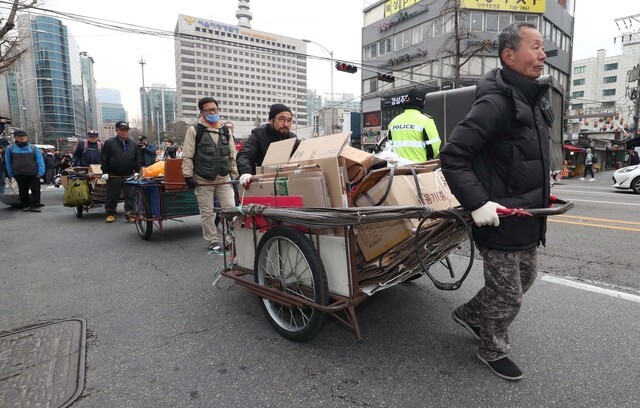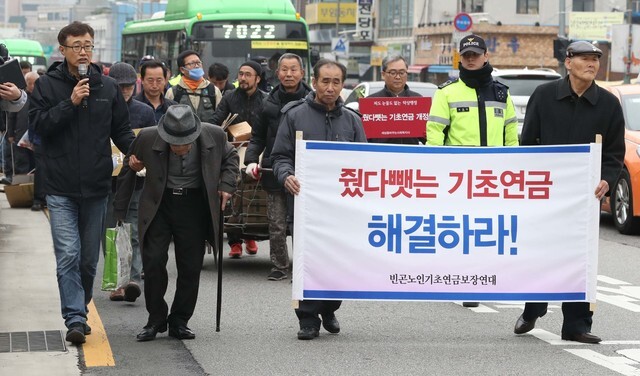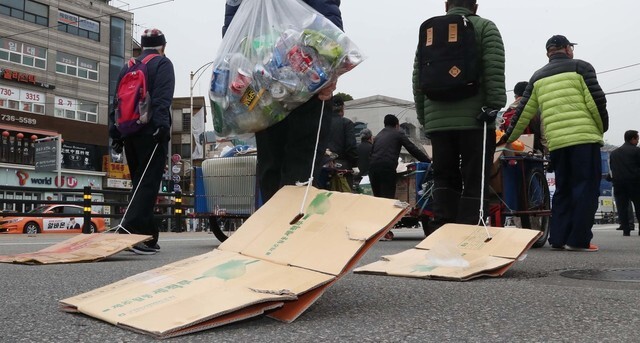hankyoreh
Links to other country sites 다른 나라 사이트 링크
[Reportage] Elderly people in poverty march to Blue House to demand payment of pension benefits

“No matter how much paper and cardboard boxes I pile into my handcart, it’s hard to even get 10,000 won [US$8.83] at the scrapyard.”
Cho In-hyeong, 75, who has been making a living by selling scrap for more than a decade now, only picks up scrap metal, instead of scrap paper. No matter how many battered pots, frying pans and aluminum cans he picks up every day, the most he can make is 100,000 won (US$88.32) a month. In his younger years, he would make 100,000 won a day on construction sites; but now, he has to make do for an entire month on that amount.
Times are even tougher for elderly people who pick up cardboard boxes, which earns them even less money than scrap metal. Nowadays, scrapyards pay between 30 and 50 won per kilogram of scrap paper (US$1=1,132 won). The Citizens’ Alliance for the Welfare of Elderly Scrap Paper Collectors estimates that there are some 1.75 million elderly people around the country who make a living by picking up scrap paper. The alliance drew this conclusion from a survey of 70,000 scrapyards around the country that found that the scrapyards took in trash from an average of 25 elderly people.
“Before the Asian financial crisis in the late 1990s, scrapyards were paying more than 150 won per kilogram. But the price has plummeted since then, which has made things even tougher for the elderly,” said Jeong Byeong-un, joint chair of the Resource Recycling Alliance, a group representing the operators of scrapyards nationwide.
The percentage of elderly poverty in South Korea is 46% (as of 2015), the highest level among member states of the OECD (Organization for Economic Cooperation and Development), where the average is 12.5%.
At 11 am on Mar. 25, Cho In-hyeong adjusted his heavy jacket as the wind blew. The cold snap was supposedly over, but the wind still felt chilly. Cho was standing near Gyeongbokgung Palace Station, on line 3 of the Seoul metro, in Jongno District. Cho began to slowly pull a handcart stuffed with scrap. Two other handcarts followed behind him. About 10 elderly people were walking nearby, pulling along cardboard boxes with strings. There were several people carrying plastic bags filled with aluminum cans over their shoulders. Park Jeong-hyeok, 90 years old, was walking in front of Cho, bent over nearly parallel to the ground and leaning on a cane.

About 100 elderly people were walking in a long line. They weren’t headed to the scrapyard this time, but to the Blue House. The distance from Gyeongbokgung Palace Station to the Blue House is just over 1km, which would take about 20 minutes for the average adult to walk. But it took these elderly people about an hour to cover the distance, with some help from passersby. At the very front of the procession was a banner bearing the slogan, “They won’t let us keep our basic pension. We need a solution!”
Cho In-hyeong, who led the handcart procession, is a beneficiary of basic living security who lives in a flophouse in the Dongja neighborhood of Seoul’s Yongsan District. When his basic living security and housing benefits are added up, he receives about 700,000 won (US$618.27) a month. About 200,000 of that goes to his monthly rent. When the basic old age pension system was introduced, Cho was glad. He’d hoped he wouldn’t have to spend so much of his time picking up trash as he struggled to earn “a few extra won for my smoking habit.”
Increase in pension benefits made meaningless
But Cho’s expectations were soon replaced with disappointment. The joy brought by the arrival of his basic pension in his bank account on the 25th of each month was short-lived as well. When his basic living security allowance is disbursed on Apr. 20, the actual amount he gets will be curtailed by the amount of his basic pension. Unlike disability benefits and allowances for people of merit, the basic pension is classified as a form of income under the basic living security system. That results from the “supplemental principle” in the National Basic Living Security Act. In short, basic living security is supposed to supplement and promote the individual’s effort to utilize their other income, assets and work ability.
Though the basic pension for elderly individuals in the first quintile, or bottom 20%, of income earners is supposed to increase to 300,000 won (US$264.96) a month in April, there’s no reason for Cho to rejoice. For elderly people whose basic pension is deducted from their basic living security benefits, this pension might as well be pie in the sky. But since elderly people just above the poverty line do receive the elderly pension, a “regressive income gap” is opening up between them and elderly beneficiaries of basic living security. According to the household trends survey for the fourth quarter of last year that was carried out by Statistics Korea, the households in the bottom 20% of income earners had an average age of 63.4. That reflects the severity of poverty among the elderly.
The Ministry of Health and Welfare estimates that there are 1.54 million elderly people in the bottom 20% of income earners, the category that receives 300,000 won (US$265.02) a month in basic pension benefits. But some 370,000 of the people in this category are already beneficiaries of basic living security, which means that once again they’re unlikely to receive any actual assistance from a basic pension that’s subtracted from their other benefits.
“They say that the basic pension is going up to 300,000 won next month. But for me, the only difference is that the amount they’re deducting from my basic living security benefits is going up from 250,000 won to 300,000 won,” said 86-year-old Kim Ho-tae, an elderly beneficiary of basic living security who lives in the Huam neighborhood of Seoul’s Yongsan District.
Kim Myeong-ho, 73, who lives in a rental apartment in the Daebang neighborhood of Seoul’s Dongjak District, has a similar viewpoint. “When the basic pension was first introduced, elderly folks who are on basic living security were excited, thinking their quality of life would improve a little. But the introduction of the basic pension system hasn’t improved my life at all,” Kim said with a sigh.
Kim, who lives alone, gets by on 500,000 won (US$441.74) in benefits from basic living security and a housing subsidy of 50,000 won (US$44.17). “When my basic living security payment is deposited into my bank account, I can’t even touch it until various utilities and rent have been paid. I’m barely able to make ends meet with the remainder,” he said.
Democratic Party promised to address issue during 2016 elections
“How long is the Moon administration going to disregard the fact that the basic pension is being robbed from the poorest old people in our society?” asked the Coalition for Guaranteeing the Basic Pension to Elderly People in Poverty, which organized the protest. The protest organizers called on the government and the Blue House to take steps to address the situation. Tackling the issue of basic pension being subtracted from other benefits was one of the campaign pledges made by the Democratic Party in the parliamentary elections in 2016.

Last year, the National Assembly’s Health and Welfare Committee agreed on a plan for elderly beneficiaries of basic living security to get a bonus 100,000 won (US$88.35) a month in lieu of the basic pension, but this compromise failed to clear opposition on the floor of the National Assembly. Funding this extra payment would have required an allocation of 410.2 billion won (US$362.4 million) in this year’s budget.
“National Assembly lawmakers set aside hundreds of billions of won in funding for their own constituents but torpedoed an appropriation that would have paid just 100,000 won a month to elderly people in poverty. How can the Moon administration talk about an all-inclusive welfare state when it ignores the fact that the government is clawing back the basic pension being given to poor old folks?” said Oh Geon-ho, chair of the operating committee of A Welfare State for the People by the People. According to Oh, Moon could ensure that elderly beneficiaries of basic living security receive the basic pension, too, by revising the enforcement decree of the National Basic Living Security Act.
“We’re considering a number of options, such as paying a bonus as discussed in the National Assembly last year,” said an official with the Ministry of Health and Welfare.
While announcing the Ministry’s business plan for this year on Mar. 11, Minister Park Neung-hoo addressed the issue of basic living allowance recipients not benefiting from the basic elderly pension. “We obviously hope to resolve this problem by subtracting some, if not all, of the basic pension amount from the income recognized [under the basic living security system] so that the basic pension and the basic living security system can provide meaningful help to elderly people in poverty,” Park said.
On Monday, the Coalition for Guaranteeing the Basic Pension to Elderly People in Poverty sent a letter to the Blue House calling for a resolution of the issue of poor elderly people not benefiting from the basic pension.
By Hwang Ye-rang and Park Hyun-jung, staff reporters
Please direct comments or questions to [english@hani.co.kr]

Editorial・opinion
![[Column] Samsung’s ‘lost decade’ and Lee Jae-yong’s mismatched chopsticks [Column] Samsung’s ‘lost decade’ and Lee Jae-yong’s mismatched chopsticks](https://flexible.img.hani.co.kr/flexible/normal/500/300/imgdb/original/2024/0512/3017154788490114.jpg) [Column] Samsung’s ‘lost decade’ and Lee Jae-yong’s mismatched chopsticks
[Column] Samsung’s ‘lost decade’ and Lee Jae-yong’s mismatched chopsticks![[Correspondent’s column] The real reason the US is worried about Chinese ‘overcapacity’ [Correspondent’s column] The real reason the US is worried about Chinese ‘overcapacity’](https://flexible.img.hani.co.kr/flexible/normal/500/300/imgdb/original/2024/0510/5217153290112576.jpg) [Correspondent’s column] The real reason the US is worried about Chinese ‘overcapacity’
[Correspondent’s column] The real reason the US is worried about Chinese ‘overcapacity’- [Editorial] Yoon’s gesture at communication only highlights his reluctance to change
- [Editorial] Perilous stakes of Trump’s rhetoric around US troop pullout from Korea
- [Guest essay] Preventing Korean Peninsula from becoming front line of new cold war
- [Column] The state is back — but is it in business?
- [Column] Life on our Trisolaris
- [Editorial] Penalties for airing allegations against Korea’s first lady endanger free press
- [Editorial] Yoon must halt procurement of SM-3 interceptor missiles
- [Guest essay] Maybe Korea’s rapid population decline is an opportunity, not a crisis
Most viewed articles
- 1Seoul’s plan to adopt SM-3 missiles is like wanting a sledgehammer to catch a fly
- 2[Column] Samsung’s ‘lost decade’ and Lee Jae-yong’s mismatched chopsticks
- 3[Correspondent’s column] The real reason the US is worried about Chinese ‘overcapacity’
- 4Korea poised to overtake Taiwan as world’s No. 2 chip producer by 2032
- 560% of young Koreans see no need to have kids after marriage
- 6[Editorial] Yoon’s gesture at communication only highlights his reluctance to change
- 7Yoon voices ‘trust’ in Japanese counterpart, says alliance with US won’t change
- 8Yoon rejects calls for special counsel probes into Marine’s death, first lady in long-awaited presse
- 9S.K.-Japan joint history project to be revived
- 10Former President Roh Tae-woo, mastermind of 1979 military coup, dies at 88